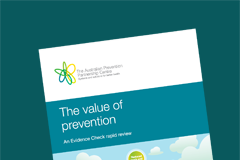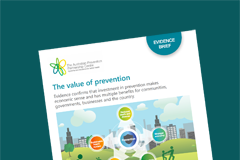The value of prevention: a rapid review
Background
This rapid review focuses on identifying and demonstrating the value of prevention in an Australian context. The review builds on previous work that has considered the health and other benefits of prevention and the cost-effectiveness of preventive health interventions particularly in terms of chronic disease prevention. The focus of this review is on four key risk factors:
- Overweight and obesity
- Unhealthy diet
- Physical inactivity
- Tobacco use and smoking.
This review summarises the health burden and economic costs of these risk factors, and identifies the relevant evidence about the health, social, economic and other benefits of population-level strategies at the primordial or primary level of prevention that protect the health of the community through reducing exposure to these risk factors.
The review will also assist investigators and partners of The Australian Prevention Partnership Centre to help build a case for continued and expanded investment in prevention within and across state and territory jurisdictions as well as at a national level.
Key findings
The evidence shows prevention is most effective when multiple strategies are used to target multiple risk factors. The following prevention strategies are particularly effective and/or cost-effective:
- Regulation and policies – such as plain packaging of tobacco products, improved food labelling, limiting unhealthy food advertising to children, smoke free policies
- Fiscal interventions – such as taxing harmful products including tobacco, sugar-sweetened beverages and alcohol
- Healthy lifestyle programs – including some mHealth (use of mobile and wireless technology) and eHealth (use of information and communication technology) programs
- Health promotion in different settings to create health supporting environments – particularly in schools, early childhood, workplace and maternity service settings
- Built environment and transport – such as supporting active travel, more walkable communities, and access to green space
- Social marketing and mass media campaigns to support regulatory, fiscal and environmental initiatives – particularly campaigns to promote physical activity and prevent smoking uptake.
The authors
- Elly Howse
- Paul Crosland
- Lucie Rychetnik
- Andrew Wilson
- Members of the Evidence for Action division, the Sax Institute.
Associated content
-
The value of partnership research to reduce harm from alcohol use
Resource category:Podcasts
Date

